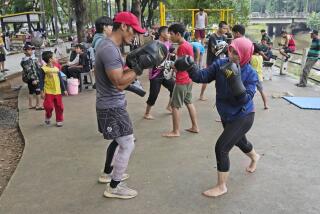Combat Duty With Rebels in Ethiopia Encourages Equality : Women in War Break Traditions
- Share via
ABI ADI, Ethiopia — As a frightened 9-year-old, Alganesh Behre was forced into marriage with a man three times her age. “At age 14, I was divorced and started working as a housemaid,” she recalls without emotion.
Today, thanks partly to Alganesh, girls are protected from such early marriages in this rebel-held town where the Tigre People’s Liberation Front has encouraged women to break out of their traditional roles.
Women are serving as rebel soldiers or taking a more active part in community life.
Alganesh, 34, is one of three founding women members of the local council organized by the rebels in Abi Adi. This council, or “baito,” runs schools and other local services. It has set the age of marriage for girls at 14 and imposes fines and prison sentences on parents who break the rule.
Overthrow of Emperor
The left-wing rebel movement took up arms in 1975 in Ethiopia’s northern Tigre province during the turmoil that followed the overthrow of Emperor Haile Selassie. Its object is to create a nationwide movement to bring down the government of President Mengistu Haile Mariam.
Although the rebel front embraces Marxism, as does the government in Addis Ababa, it accuses the president of perpetuating the Amhara ethnic group’s longstanding grip on power in Ethiopia.
The 3 million people of Tigre mainly belong to the Tigrinya ethnic group, a traditional rival of the Amharas.
The rebels have controlled most of rural Tigre since the early 1980s and after a series of battles in February hold virtually the entire province, including the capital, Mekele.
Abi Adi has been in rebel hands for five of the last seven years and Alganesh said the rebel takeover changed her life.
Had ‘No Political Rights’
“Women were suppressed. We were never seen in public meetings, we had no political rights,” she said.
Draped in a white shawl which leaves the cross-shaped wkato ritual tattoo on her forehead uncovered, Alganesh said she has remarried, a man of her own choice.
As a councilor she voted to raise the minimum marriage age to 14 for women and 22 for men, although she and other members suggested that 14 is too young for a girl to marry.
Change comes slowly even among the rebels. Only one member of the front’s newly elected 35-member central committee is a woman.
But the ideal of equality is strongly pursued by the armies of the Tigre People’s Liberation Front and its ally in neighboring Eritrea province, the Eritrean People’s Liberation Front. Both groups say a third of their fighters are women.
“The men can see in practice and the political education they were getting that men and women are equal,” said Bessrat G’Selassie, a 24-year-old fighter who joined the Tigre rebels 10 years ago as an orphan.
Women With Rifles, Grenades
Tigre women accustomed to traditional roles are intrigued by female fighters marching past peasant homesteads and into towns, Bessrat said, a Kalashnikov rifle slung over her shoulder, hand grenades strapped to her waist.
“When they see me with a gun, they get excited. When I talk to them, they ask me how I can do it,” she said.
The Ethiopian government pursues an official policy of equality for women but has had limited success in transforming traditional rural society.
The rebel movements have always been based in the countryside and their social influence is much stronger.
Rebel officials said some peasants initially resisted the liberation of women, but opposition faded when the movement began distributing land formerly held by feudal landlords.
In Abi Adi, the rebels distributed land to 7,000 families, abolished the peasants’ longstanding obligation to hand over three-quarters of their harvest to the landlord and allowed them to sell all their food surplus on the free market.
The Ethiopian government has distributed land to peasants in areas it controls but has obliged peasants to sell much of their produce through a state-controlled marketing system at fixed and often artificially low prices.
Peasants Hid Grain
The rebels say their free-market system has aided the distribution of grain which peasants previously hid from the government.
The highlands of Tigre are overpopulated, and the rebels encourage peasants to move to vacant fertile land in the western lowlands near the Sudanese border in a program that parallels the government’s resettlement scheme.
The government plans to move 1.5 million people from the northern highlands to new settlements in the south and west, but the rebels have accused it of using the program to empty the Tigre countryside of rebel supporters.
The people of Abi Adi are uninterested in resettlement. Alganesh said townsfolk and peasants were rebuilding Abi Adi’s health clinic, bombed three times since 1984, and are planning to reopen seven primary schools run by the “baito.”
But the residents, presently 60 miles from the southern military front, are also preparing for a government counteroffensive, she added.
“They are ready to fight because they know they would lose all the rights and gains they have achieved,” she said.
More to Read
Sign up for Essential California
The most important California stories and recommendations in your inbox every morning.
You may occasionally receive promotional content from the Los Angeles Times.













